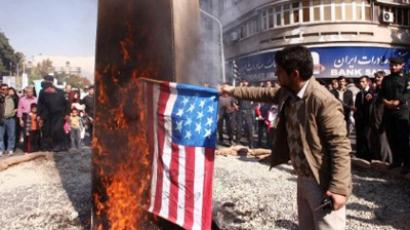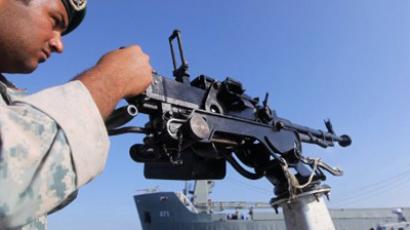Political theatre: Currents behind Iranian-Western standoff
If the EU puts its plan to sanction Iranian oil exports into practice, there will be hard consequences on the European economy. But experts say the West's sanction policy is motivated purely by politics.
The sanctions could come into effect by the end of January, unless Iran backs down on its alleged nuclear weapons program.Tehran has responded to the sanctions with its own threats to block oil trade through the crucial Strait of Hormuz, leading to a continued deadlock in the Persian Gulf.American warships are also present in the region, with a mission to prevent any hindrances of passage.RT talked to professor of political science Pierre Guerlain, from Paris West University Nanterre La Defense, who is certain that the standoff between the West and Iran is driven by politics, not economics.“From the economic point of view, it [sanctions] is not wise” he says, but measures are “coming from leaders who are facing elections; Obama in the US. And Obama has to be very tough on Iran, because he is accused by the Republicans of being soft on Iran.”Iranian leaders, Guerlain believes, also have strong political reasons to continue the standoff, making the current conflict a “game where everything is trying to benefit from the opposition of the other.”“Being tough on Iran is good for Obama, being oppositional to the US is good for Iranian leaders, who are themselves quite discredited in their own country," Guerlain explains, adding that “everyone benefits politically though economically everyone could be hurt.”
US contributed into Iran’s geopolitical might
Washington’s intercourse with Iran is nothing but “a strategic foreign policy problem” acquired since their failure in Iraq, says John Rees, a political activist and national officer at the Stop the War Coalition. “The war in Iraq was meant to give them a stable pro-Western, pro-business base for operations in the Middle East,” Rees told RT. “What they ended up doing is making Iran a greater regional power than it was before. This is what the sanctions are about.” The conflict is not just about nuclear weapons in the Middle East, or the US would be bound to pick on Israel, which is the region's only nuclear power, continues Rees. “The reason for this continued conflict is that the American administration simply cannot live with an Iran which has as much regional power as it has at the moment. They see its links with Syria, they see its links with Hamas, they see its links with Hezbollah. This is a challenge to the American power in an absolutely critical – economically and geopolitically – area of the globe."














